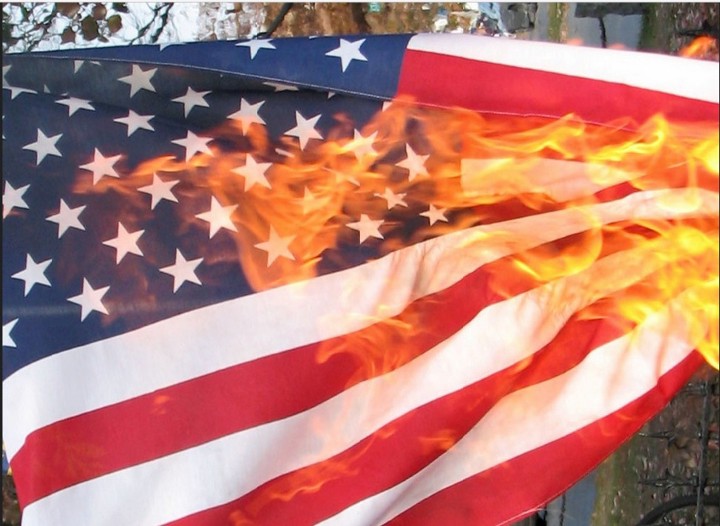
As of the past few years, the issue of desecrating the U.S. flag has intensified. Some are saying it is illegal, some are proclaiming it is free speech, others are maintaining that it is immoral. Many will say they are ostracized to the middle of this issue.
Videos on social media are showing demonstrators burning the flag, standing or walking on them, ripping them down, and more. There are videos of, so-called, patriots defending the desecration of the flag by means of removing the flag from ashes, taking the flag out from under people’s feet, or even the use of physical violence and threats. Accompanying these videos are swarms of commenters suggesting prison time for the offenders, laws preventing the desecration of the flag, or physical violence as much as death threats.
So, is it illegal for people to desecrate the U.S. flag? Perhaps in some areas there have been local laws created for desecration of flags or arson of any sort, in general. Federally, ‘United States v. Eichman,’ 1990, overturned ‘Texas v. Johnson,’ 1989, where it was decided that desecrating the flag was protected under the First Amendment of the U.S. Constitution. This has remained as protected speech since the Supreme Court’s decision in 1990, but it has been an ongoing issue since the first laws passed in 1968 with the Federal Flag Desecration Law. This will continue to be a battle for many.
Among the protections of the First Amendment is freedom of speech. This freedom, protected by the Constitution, is protecting the people from government. Furthermore, freedom of speech is not just speech that everyone agrees with, as one can easily find in Communist countries. This freedom is prelegal, and protects individuals for speech that is despised by the masses and government. Freedom of speech without the right to offend is no freedom at all.
What about all of those that died for the right to speak freely and to live in a protected land? The desecration of the flag is one of those rights fought for, as it is a freedom of speech. It is not always the most prudent or tactful form of protest, and it is not the most economical. Nevertheless, a demonstration of criticism or condemnation by an individual, even of those that fought for that very right, is still a needed right among a free people. To say that one is not legally allowed to do such creates a dynamic and ever-growing oppressive state controlling the people, rather than the freedoms being proclaimed previously fought for by those that died in its defense.
Mere legality means very little when it comes to the philosophy of Liberty. Many restrictive and harmful laws have existed, and still exist, but that does not mean they are justified or that they should even exist. There have been countries and dictators that have changed all of their laws in order to carry on their destructive agendas, just so that they precisely follow their created laws. This does not mean they are right in doing so. Victimless “crimes” leave a lot of room for subjectivity in law.
“Well, if you don’t like it, you should leave!” This is an all too common phrase echoed by many Conservatives and Republicans, especially when it comes to criticisms of the state or desecration of the flag. This is an informal fallacy known as “argumentum ergo decedo,” also known as “The Traitorous Critic Fallacy.” Much like the “tu quoque” fallacy, it does not address the criticism or topic at hand, rather it points to the person speaking. It is similar to a mafia running a neighborhood, and when one shopkeeper voices an opinion of disapproval for the practices of the mafia, the shopkeeper is told to either pay and obey or leave. The best practice is to have open debate and peaceful discussion with people rather than restricting criticism or freedom of expression.
To threaten violence or even death for someone voicing their opinion, or in this case desecrating the flag, is exactly how governments become larger and more oppressive. To threaten banishment as a means of coercing submission to the state and only allowing speech that the majority deems appropriate is what regimes use regularly.
If the protestor owns the property they are desecrating, in this case a U.S. flag, that is theirs to do so. For others to dictate what one does with their property is contradictory to Liberty. Our property rights are essential to Freedom. Without our property, we are not free. Even when we may disagree with what one does with their property, as long as it does not infringe on the Life, Liberty, or Property of others, we have no justification for limiting them. If the protestor is desecrating the property of someone else, then there is reason to do something in response. The flag is not public property when one purchases it on their own. Therefore, they have the right to do with it as they please.
In the end, every individual will decide what they find to be moral or immoral, in regards to the desecration of the U.S. flag, as that is not a Libertarian position to take. Just as other forms of speech can be extremely distasteful or hurtful, they are to be protected- this includes the desecration of the U.S. flag.

